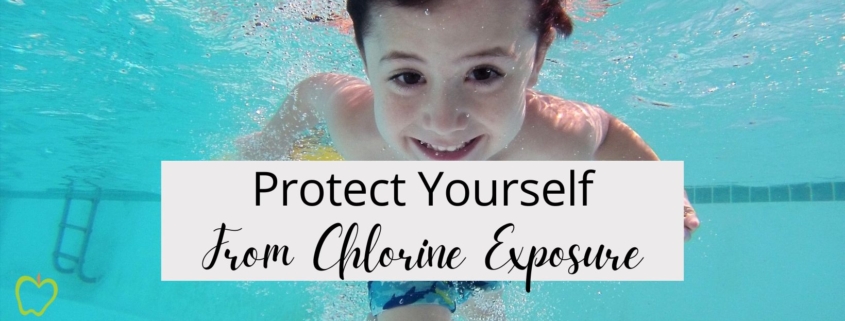Protect Yourself From Chlorine Exposure
Do you find yourself spending time during the summer in the pool to cool off, exercise, or just trying to keep the kids busy? Most of us are careful about sunscreen to protect from sunburns. But what are you doing to protect yourself from chlorine exposure?
Have you experienced sensitivity to chlorine? What did it feel like? Itchy, dry skin, airway irritation, dry hair, coughing, or irritated eyes are just some of the symptoms that people report. It’s possible that you had some of these symptoms, but didn’t connect them to the chlorine in the pool.
What Does Chlorine Do?
Why do we put chlorine in swimming pools and spas? The answer is simple – it kills germs. Chlorine is a naturally occurring element, used to help keep the water sanitized. Even a short swim in unsanitary water can expose a swimmer to bacteria and parasites that could cause disease.
Most people tolerate chlorine, but those who swim frequently or have sensitivity to chlorine may experience some of the symptoms that I mentioned above.
Chlorine exposure has also been linked to difficulty breathing, chest tightness, eczema, and asthma. The American Academy of Pediatrics did a study of about 800 children and found that exposure to chlorine could contribute to chronic health issues.
The Chlorine Smell
When you hear the word chlorine, can you recall the smell? That smell is from chlorine interacting with sweat, sunscreen, body waste, and other chemicals to create byproducts known as chloramines.
Some chloramines are toxic when breathed in the air near the surface of the pool. They will dissipate fairly quickly around an outdoor pool; however, they are more contained around an indoor pool.
My oldest son attended college in Hannibal, MO, and when we went to events at the college, we often stayed at a hotel with an indoor pool in a central atrium. When the sliding doors opened as we entered, the smell of what I now know was chloramine would practically slap us in the face.
I don’t know how employees managed to work in that environment, and I have wondered whether some developed illnesses because of extended exposure.
Are Saltwater Pools Better?
Many have thought that a saltwater pool would solve the problem of chlorine, but these pools still contain some of the chemical. Saltwater pools use a process called electrolysis to produce just enough chlorine to disinfect the water.
In general, with a lower level of chlorine, these pools are gentler on human skin and eyes. So why aren’t there more saltwater pools in use? Because they are expensive to install and more complex to maintain than chlorine pools.
How To Protect Yourself
There are some steps you can take to reduce your exposure to chlorine while you enjoy some summer fun.
1.Form an Outside Barrier
- Rinse your body with water before you go in the pool. This decreases the amount of chlorine your skin will absorb. Then showering after a swim will wash away any chemical residue.
- Smoothing coconut oil on your skin, including your lips, before a swim is another way to avoid chlorine absorption. Wear a swim shirt over the coconut oil to protect from the sun.
2. Create an Inside Barrier – in addition to outside protection, consider some of these supplements that can enhance your protection from the inside.
- Vitamin C – this nutrient neutralizes chlorine and chloramines. It isn’t made in your body so it is important to be eating sources of Vitamin C and also supplementing, especially on days you will swim. I suggest starting with 1000mg in the morning and evening of a swim day.
- Taurine – an amino acid that helps your body to bind chlorine and remove it from your body. Take this supplement on an empty stomach in the morning before your trip to the pool.
- Iodine – like chlorine, iodine is a member of the halide family. The halides absorbed in your body can compete for access to the halide receptors in your cells, so having a good level of iodine can keep chlorine and other halides out. I caution you to take a gentle approach to iodine supplements – consuming foods like seaweed or yard eggs can provide iodine, or you can paint a 1” diameter patch of Betadine solution on your skin for it to absorb. If the patch disappears, your body needs the iodine.
Detox Bath
Besides rinsing your body before and after you spend time in the pool, it is wise to do some added detox before bedtime. An Epsom salt bath is not only relaxing but can help draw the chlorine out of your body.
I generally use 2 cups of Epsom salts in my detox bath. I also add some essential oils to the Epsom salts in my hand before pouring it under the running water. By doing this, you avoid the essential oils floating on top of the water.
Don’t Forget Your Hair
Any swimmer will tell you that the chlorine from pool water can damage your hair. If you don’t want to wear a swim cap, I recommend that you wet your hair when you rinse your body before swimming. Then apply a leave-in conditioner to prevent absorption of the chemical into the hair shaft.
After swimming, mix a tablespoon of baking soda into a cup of water and work it through your hair to absorb any remaining chlorine. Rinse your hair well and wash with a mild shampoo.
Summer and swimming go together so well. With a little forethought, you can take steps to protect your body from the effects of the chlorine that is so common in pool water.









